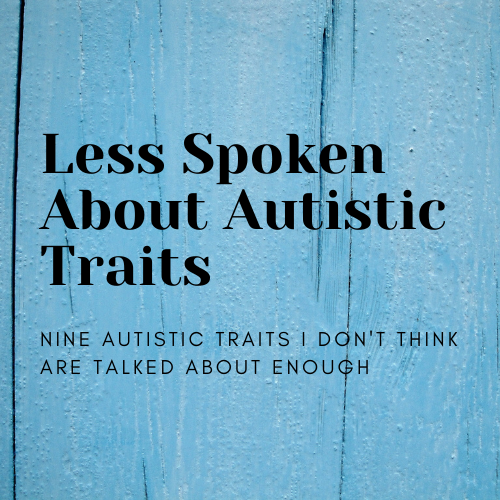Less Spoken About Autistic Traits
Some autism traits are spoken about a lot. Others, not so much, even though they still affect our daily lives. So, what are some of these less spoken about autistic traits?
Face blindness. This is where somebody struggles to recognise other people’s faces. This can be really frustrating. People walk up to me and start talking as if I know them, but I can’t work out who they are. Seeing someone in a different context, or someone I don’t know well makes this harder. Prosopagnosia is the official name of this condition, in which a person simply cannot recognise people’s faces at all. I don’t experience face blindness this severely, but some do.
Having no filter. Many autistic people find that they say exactly what they are thinking and exactly what they mean. Words have a habit of just spilling out of my mouth without me thinking. This would be fine if we lived in a society which appreciates blunt honesty. But we don’t, so unfortunately this often means we can be perceived as rude.
The ‘autism accent’. Professionals would describe this as abnormal speech patterns. I’m not sure what specifically is different about our voices, but some autistic people find that they are often asked about their voice or accent. I have been. In primary school other kids used to mock my voice. Now I mainly just get told I’m posh or get asked where I’m from. Perhaps this is just a coincidence. Anyhow, many autistic people have adopted the term ‘autism accent’ to describe this phenomena.
Difficulty with motor skills. I couldn’t catch a ball in PE. In fact, recent research shows that autistic children are less likely to be able to catch a ball than non-autistic children. We can lack fine motor co-ordination skills. Sports, and even simple things like carrying stuff, can be difficult for this reason. We may have slower reaction times than other people. We may lack co-ordination. We may be clumsy or be ‘awkward’. This can be embarrassing, especially if you’re twelve and in a P.E. class and the other kids are laughing at you.
Talking too fast or too loudly. I have difficulty regulating the volume and speed of my voice. When I was little, I was constantly told to use my ‘indoor voice’ and take deep breaths in between sentences, because it would seem like I wouldn’t breathe when talking. I don’t have to be told to breathe between sentences anymore, but I do actively have to remind myself to lower the volume and slow down.
Being extremely obedient. Even when this is detrimental to the person’s physical or mental health. For example, following an instruction even if you’re in pain because you believe you have to obey and do what you are told. I was very much like this throughout my childhood. I would never move from my cot or my bed until my parents came in and told me I could.
Lack of fear towards danger. This can seem contradictory when we may be anxious around seemingly harmless things, yet impulsively put ourselves in danger in different situations. This is thought to be due to higher impulsivity and our focus being fixated on something else. I struggle to focus on more than one thing at once. So, if my thoughts are elsewhere, or I am glued to something else, I may miss signs of danger around me.
A better connection with animals than with people. Many autistic people love animals. This is a common special interest for autistic girls. We can find animals easier to connect to and understand than other people, and they give us unconditional love. There are no social expectations with them. They just love us, as we are.
Gastrointestinal problems. These are very common in autistic people. A 2014 study suggests that autistic children are four times more likely to experience constipation, diarrhoea, or abdominal discomfort. Many other studies support this too in both autistic children and adults. There’s a lot of uncertainty about whether this is to do with our bodies being more sensitive to certain foods and changes in diets, or whether this is to do with higher anxiety levels, or perhaps a mixture of both.
These are just nine autistic traits which I believe are rarely discussed. What other autistic traits do you think are less spoken about? Please share your thoughts in the comments below!
All my love,
Emily.
